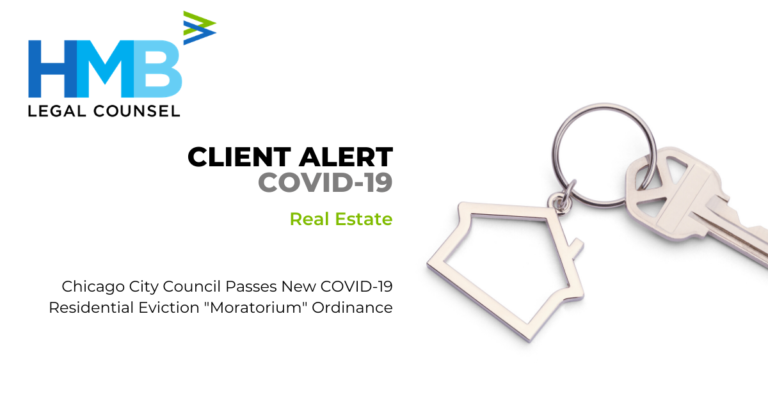On June 17, 2020, the Chicago City Council passed the “COVID-19 Eviction Protection Ordinance” (Ordinance O2020-3501), enacting a provisional moratorium on evictions based upon the failure to pay rent if the tenant has suffered any loss, reduction or delay in receipt of income or employment attributable to COVID-19 (a “COVID-19 Impact”). Under the terms of the moratorium, a landlord pursuing an eviction or other relief against a nonpaying tenant must navigate additional procedural hurdles.
Broader in scope than the Chicago Residential Landlord and Tenant Ordinance (the “RLTO”), the Eviction Protection Ordinance applies to every rental agreement for a dwelling unit located within the City of Chicago. This includes dwelling units in owner-occupied buildings of six units or less, which are exempted under the RLTO. With this notable exception (and an added exception for hotels or inns used as shelters under contracts with the City for individuals affected by COVID-19), exemptions under the Eviction Protection Ordinance mirror those under RLTO.
The moratorium is retroactive to March 21, 2020, and applies until 60 days after the last to expire of (i) Governor Pritzker’s Executive Order 2020-10 and Executive Order 2020-30 or (ii) General Administrative Order 2020-01, as amended, by Chief Judge Timothy Evans of the Cook County Circuit Court, as each may be amended or extended. Shortly after the City Council passed this ordinance, Governor Pritzker announced that the moratorium on residential evictions throughout the state will be extended through July 31, 2020.
For the duration of the moratorium, landlords of covered dwellings are required to undertake the following additional steps in order to terminate any residential tenancy based on nonpayment of rent:
- The landlord must first provide the tenant with a 5 day notice of termination for failure to pay rent, in addition to a written statement that the tenant has 5 days to provide a “Tenant Notice of COVID-19 Impact”. A Tenant Notice of COVID-19 Impact includes any electronic or written communication from the tenant to landlord which reasonably informs the landlord of the tenant’s COVID-19 Impact. The ordinance notes that the Department of Housing will post an online example of the required notice and written statement from the landlord.
- In the event that the landlord receives a Tenant Notice of COVID-19 Impact before or during the 5 day notice period, the landlord must wait at least 7 additional days before filing an eviction action or other action for rent or damages, referred to as a “cooling off” or “negotiation” period. During the 7 day period, the landlord must make reasonable attempts to negotiate with the tenant to reach an agreement for repayment of the unpaid rent.
- Landlords should be aware of the following requirements regarding repayment agreements:
- Any agreement reached with the tenant must be documented in writing.
- The landlord is not permitted to request information regarding retirement accounts, assets or personal property.
- Landlords may not require a tenant to execute a non-disclosure agreement as part of any agreement relating to unpaid rent.
- Landlords may not require any waiver of any right relating to the condition or habitability of the premises.
- Repayment plans may not include interest at a rate higher than the rate for security deposits as published by the City Comptroller (currently .01%).
- Late fees, charges, costs or other penalties on unpaid rent may not exceed $10.00 per month for the first $500.00 in unpaid monthly rent, plus five percent for any amount in excess of $500.00 in unpaid monthly rent.
- In the event that landlord and tenant agree to apply a security deposit and interest on the security deposit to unpaid rent, the tenant is deemed to have waived any claims against the Landlord related to the security deposit arising under Sections 5-12-080 and 5-12-081 of the RLTO, to the extent of the credit received against unpaid rent.
- The Eviction Protection Ordinance provides certain examples as acceptable repayment agreement terms, including: (1) repayment plans amortizing unpaid rent over at least 60 days; (2) submitting to binding arbitration; (3) applying the security deposit and interest on the security deposit to unpaid rent; (4) permitting the tenant to move out of the dwelling unit in a reasonable time in exchange for a complete or partial waiver of any unpaid back rent. While the ordinance does not mandate these resolutions, it is possible the courts may consider these examples in evaluating the terms of an agreement and in considering whether a landlord engaged in good faith efforts to reach a repayment agreement.
- In the event an agreement is not reached with the Tenant, the Landlord may proceed to pursue the eviction or recovery of unpaid rent, however the Landlord must plead and prove that it made reasonable attempts to contact the tenant and engage in good faith negotiations. A tenant that suffers a COVID-19 Impact and provides timely notice to Landlord may raise Landlord’s failure to contact the tenant or engage in good faith negotiations as an affirmative defense. The defense is retroactively effective for lawsuits filed before the date of the ordinance.
In the event that the landlord does not receive a Tenant Notice of COVID-19 Impact, the landlord may continue proceedings to terminate the tenancy or pursue other remedies as normally provided for under the RLTO. Similarly, the ordinance does not provide any limitations or restrictions on any attempts to terminate a tenant for matters other than payment of rent, including terminations based on a tenant’s material noncompliance with lease terms.
As with all matters relating to residential tenancies in the City of Chicago, it is necessary to tread cautiously and in strict compliance with the RLTO as well as the Eviction Protection Ordinance. We encourage you to promptly consult with real estate counsel should you have any concerns related to a residential tenant lease.
HMB Legal Counsel will continue to provide updates as the situation evolves. The ongoing issues related to the spread of the Coronavirus (COVID-19) have had and will continue to have a significant impact on individuals, families, businesses and markets. Visit our collection of resources providing guidance during these fast-changing circumstances. To discuss how the COVID-19 Eviction Protection Ordinance may impact your multifamily portfolio, please contact a member of the Real Estate team.






